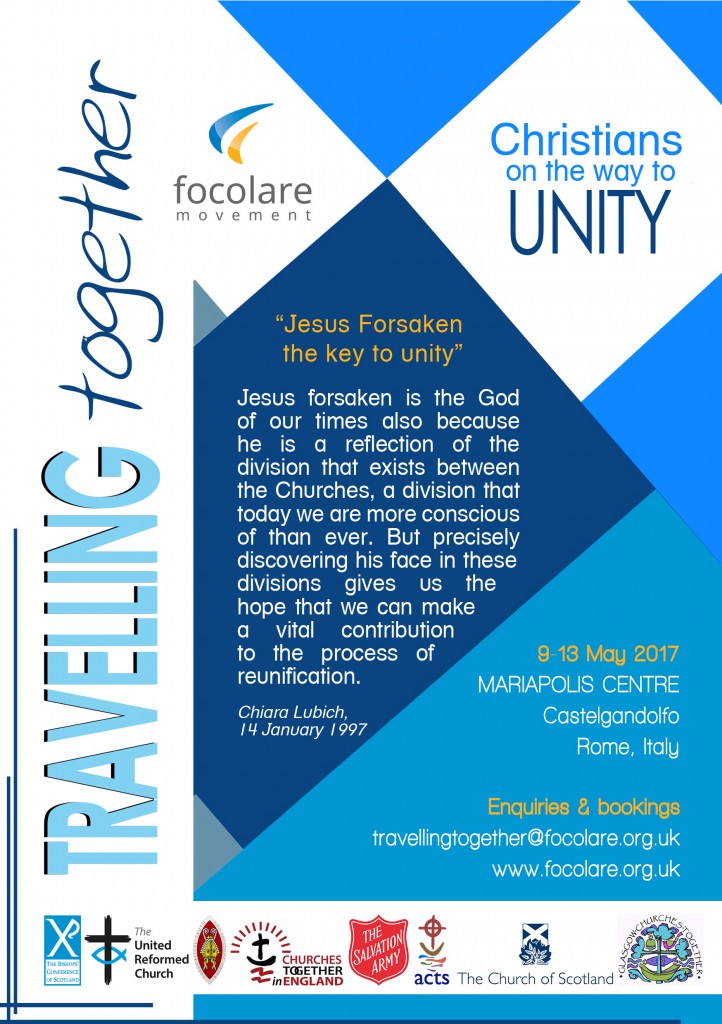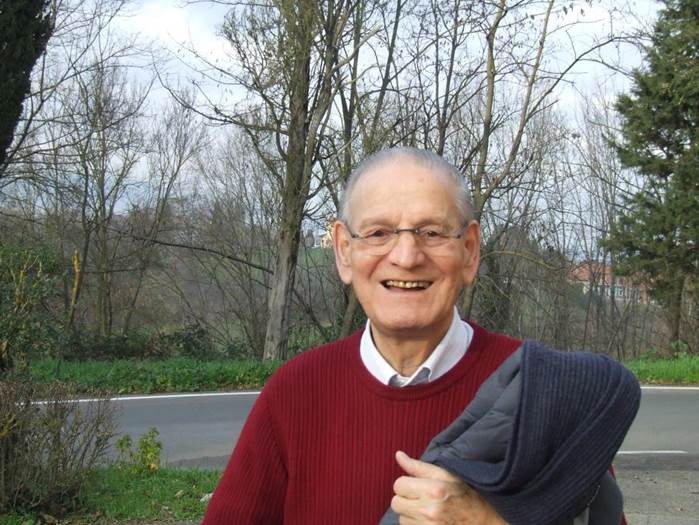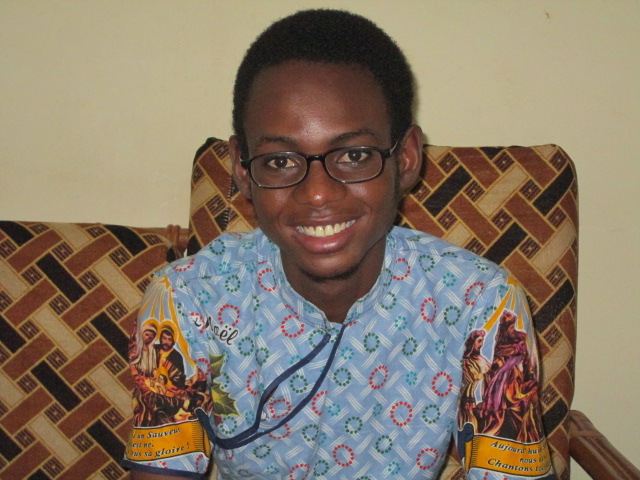Spot GenFest Manila 2018
https://youtu.be/FZLJ_xLw9dk
https://youtu.be/FZLJ_xLw9dk
 “Unity among Churches requires heroes, heroes in faith, heroes who face history, heroes who are humble in spirit”. Pope Tawadros II said these words in Alexandria, Egypt in 2015, when celebrating the first Day of Friendship between the Orthodox Coptic Church and the Catholic Church. During his recent visit to Cairo, Pope Francis repeated the same thought when he said, “In the light of God who wishes us to be ‘perfectly one’ it is no longer possible to take refuge behind the pretext of differing interpretations, much less of those centuries of history and traditions that estranged us one from the other”. The Pope also spoke about “an already effective communion that grows daily”, the mysterious and ever present fruits of “a genuine ecumenism of blood”, and the importance of progress in our ecumenical journey because “static ecumenism does not exist”. Christians inspired by the Focolare spirituality of unity are convinced of this because of the experience lived in these last years. The 59th Ecumenical Week, to be held at Castelgandolfo, Rome from the 9 to 13 May 2017, blends into the current ecumenical trend, which brings to the foreground gestures, words and statements of Church leaders and also initiatives of Christians in different parts of the world. 700 Christians hailing from 40 countries and belonging to 70 Churches and ecclesial Communities are expected to attend. During this “Ecumenical Mariapoli”, as many prefer to call this event, living together, sharing, spirituality and reflection will take place,and it will be a new step towards “the dialogue of life” and “the ecumenism of the people”. In fact, Chiara envisaged the “dialogue of life” as the typical contribution of the spirituality of unity towards full, visible communion among Churches . It is of utmost importance that people are well prepared ecumenically. Fully aware of the many steps still to be taken and with respect towards all Churches, we try to delve deeper into the common heritage that already unites us. The title of this ecumenical meeting is: “Walking together. Christians on the road to unity”. Its focal point will be a central theme in the spirituality of unity: Jesus crucified and forsaken: the God of our time, foundation for a spirituality of communion. It will be enriched by moments of reflection, dialogue and testimonies of people from different parts of the world, While the 500 years since the Lutheran Reformation are being celebrated in the ecumenical field, among the main speakers, one will find: Bishop Christian Krause, former President of Lutheran World Federation; Rev. Dr. Martin Robra of the World Council of Churches in Geneva; Bishop Brian Farrell, Secretary of the Pontifical Council for Promoting Christian Unity and Maria Voce, President of the Focolare Movement.
“Unity among Churches requires heroes, heroes in faith, heroes who face history, heroes who are humble in spirit”. Pope Tawadros II said these words in Alexandria, Egypt in 2015, when celebrating the first Day of Friendship between the Orthodox Coptic Church and the Catholic Church. During his recent visit to Cairo, Pope Francis repeated the same thought when he said, “In the light of God who wishes us to be ‘perfectly one’ it is no longer possible to take refuge behind the pretext of differing interpretations, much less of those centuries of history and traditions that estranged us one from the other”. The Pope also spoke about “an already effective communion that grows daily”, the mysterious and ever present fruits of “a genuine ecumenism of blood”, and the importance of progress in our ecumenical journey because “static ecumenism does not exist”. Christians inspired by the Focolare spirituality of unity are convinced of this because of the experience lived in these last years. The 59th Ecumenical Week, to be held at Castelgandolfo, Rome from the 9 to 13 May 2017, blends into the current ecumenical trend, which brings to the foreground gestures, words and statements of Church leaders and also initiatives of Christians in different parts of the world. 700 Christians hailing from 40 countries and belonging to 70 Churches and ecclesial Communities are expected to attend. During this “Ecumenical Mariapoli”, as many prefer to call this event, living together, sharing, spirituality and reflection will take place,and it will be a new step towards “the dialogue of life” and “the ecumenism of the people”. In fact, Chiara envisaged the “dialogue of life” as the typical contribution of the spirituality of unity towards full, visible communion among Churches . It is of utmost importance that people are well prepared ecumenically. Fully aware of the many steps still to be taken and with respect towards all Churches, we try to delve deeper into the common heritage that already unites us. The title of this ecumenical meeting is: “Walking together. Christians on the road to unity”. Its focal point will be a central theme in the spirituality of unity: Jesus crucified and forsaken: the God of our time, foundation for a spirituality of communion. It will be enriched by moments of reflection, dialogue and testimonies of people from different parts of the world, While the 500 years since the Lutheran Reformation are being celebrated in the ecumenical field, among the main speakers, one will find: Bishop Christian Krause, former President of Lutheran World Federation; Rev. Dr. Martin Robra of the World Council of Churches in Geneva; Bishop Brian Farrell, Secretary of the Pontifical Council for Promoting Christian Unity and Maria Voce, President of the Focolare Movement.  A special moment has been entrusted to His Most Rev. Eminence Zervos Gennadios, Orthodox Archbishop of Italy and Malta. He will be speaking about: “50 years after the first meeting of two protagonists of dialogue: Ecumenical Patriarch Athenagoras I and Chiara Lubich “. The programme also includes participation in the General audience with Pope Francis at St. Peter’s Square, a visit to St. Peter’s Basilica and to St. Paul Outside the Walls Baslica and common prayers at the St. Domitilla and St. Sebastian Catacombs. This 59th Ecumenical Week is also meant to manifest the Focolare’s renewed ecumenical commitment, expressed recently in the Ottmaring Declaration, which promises to do all that is possible “so that all our activities, initiatives and meetings, both internationally and locally, will be sustained by this open, brotherly behaviour among Christians, while we entrust to God the hastening of our Churches’ journey towards celebrating in the one chalice”. Press Release
A special moment has been entrusted to His Most Rev. Eminence Zervos Gennadios, Orthodox Archbishop of Italy and Malta. He will be speaking about: “50 years after the first meeting of two protagonists of dialogue: Ecumenical Patriarch Athenagoras I and Chiara Lubich “. The programme also includes participation in the General audience with Pope Francis at St. Peter’s Square, a visit to St. Peter’s Basilica and to St. Paul Outside the Walls Baslica and common prayers at the St. Domitilla and St. Sebastian Catacombs. This 59th Ecumenical Week is also meant to manifest the Focolare’s renewed ecumenical commitment, expressed recently in the Ottmaring Declaration, which promises to do all that is possible “so that all our activities, initiatives and meetings, both internationally and locally, will be sustained by this open, brotherly behaviour among Christians, while we entrust to God the hastening of our Churches’ journey towards celebrating in the one chalice”. Press Release
On May 10, 2013, Pope Tawadros II of the Coptic Orthodox Church visited Pope Francis at the Vatican for the first time. In memory of that historic meeting, when he returned to Egypt he declared a day of Coptic-Catholic friendship that has been held ever since on May 10. The pope recently repaid the visit when he went to Cairo.

 “This evening, Marco Tecilla, the first focolarino, is latest pearl to be added to the crown of Mary. With infinite gratitude, we gather around him in an embrace which unites heaven and earth,” writes Maria Voce, President of the Focolare Movement, when she announced the passing of Marco, the first young man to follow Chiara Lubich in the way of the Focolare. The funeral will be held tomorrow, Wednesday 10th May, at 11.00 am at the Mariapolis Centre in Castel Gandolfo (Rome).
“This evening, Marco Tecilla, the first focolarino, is latest pearl to be added to the crown of Mary. With infinite gratitude, we gather around him in an embrace which unites heaven and earth,” writes Maria Voce, President of the Focolare Movement, when she announced the passing of Marco, the first young man to follow Chiara Lubich in the way of the Focolare. The funeral will be held tomorrow, Wednesday 10th May, at 11.00 am at the Mariapolis Centre in Castel Gandolfo (Rome).
Peace and unity are celebrated in Europe on May 9th. The date recalls the historic Schuman Declaration of May 9, 1950, in which the then French foreign minister proposed the creation of an economic community that would lead to the construction of a federation of European States that was indispensable in preserving peace. As a first step, Robert Schuman proposed the creation of a Coal and Steel Community for France and West Germany that could one day include other countries. He thus laid the foundations for a broader and much more comprehensive integration, to the point that today the Declaration is considered to be the symbolic beginning of the long process of peace and stability that led to the European Union. The celebration has always been an occasion to draw citizens, institutions and populations nearer to nearer to one another, increasing awareness that the human community should be founded on values of peace, integration and solidarity.

 «Ever since our parents separated, my sister and I have been living with our father. It is a very difficult situation for me, also due to my health. I have been suffering from asthma and for two years now, also heart problems. Thanks to the support of many youths who like me try to live the spirituality of unity, these physical limits do not hinder me from living my Christian commitment with enthusiasm. Instead, as a student, things were not going well. In the public school I was attending, there was not much attention for students in my situation, and when I found out that I had to repeat the first year of high school, I changed school. In the new school I understood better the importance of education and the advantage of achieving a diploma. At the start of the year, my grades were good: evidently the new incentive was working well. One evening I had a terrible headache. I hoped that it would pass during the night since in the next days I was expecting a series of tests. Effectively in the morning the headache had disappeared, but when I took my books in hand, it returned, stronger than ever. The same thing happened every time I tried to concentrate on an intellectual task. I went to many hospitals but none were able to diagnose my disease. Meanwhile the average of my grades dropped, while my headache had become a permanent thing. My father had no more money to pay the doctors, so I tried to consult the traditional quack doctors, to no avail. Overcome by this situation strong doubts of faith started to assault me. I asked myself: out of seven billion people in this situation, why did this have to happen precisely to me, now that I had decided to take my studies seriously? Despite my rebellion I wanted to participate with the Gen in an educational weekend. I attended only to see my friends, and not really because I believed in it. The meeting started with a video-speech of Chiara Lubich, but I was so angry with God that I didn’t even listen, or want to give my contribution to the communion of goods. I was even less interested in what the others were saying. My mind wandered elsewhere. I thought that God had forgotten me, no one could understand me, and these meetings were useless. At a certain point, however, I was struck by a boy who said that in difficult moments we can give hope to others by valorizing our personal sufferings. And that it is precisely in making ourselves one with Jesus crucified and forsaken that we find the strength to love the others. These words were like a challenge to me. I said to myself: if Jesus on the cross had pulled back, what would we do now. From that moment on I found the strength to accept my situation and the certainty that God is love also when he permits suffering. And even if I continued to have headaches, I found the joy of living again, out of love for my sister and all those who tried to bring joy all around me. Thanks to the prayers of many, today I feel much better and if there are no other surprises, it seems that even my health has returned.»
«Ever since our parents separated, my sister and I have been living with our father. It is a very difficult situation for me, also due to my health. I have been suffering from asthma and for two years now, also heart problems. Thanks to the support of many youths who like me try to live the spirituality of unity, these physical limits do not hinder me from living my Christian commitment with enthusiasm. Instead, as a student, things were not going well. In the public school I was attending, there was not much attention for students in my situation, and when I found out that I had to repeat the first year of high school, I changed school. In the new school I understood better the importance of education and the advantage of achieving a diploma. At the start of the year, my grades were good: evidently the new incentive was working well. One evening I had a terrible headache. I hoped that it would pass during the night since in the next days I was expecting a series of tests. Effectively in the morning the headache had disappeared, but when I took my books in hand, it returned, stronger than ever. The same thing happened every time I tried to concentrate on an intellectual task. I went to many hospitals but none were able to diagnose my disease. Meanwhile the average of my grades dropped, while my headache had become a permanent thing. My father had no more money to pay the doctors, so I tried to consult the traditional quack doctors, to no avail. Overcome by this situation strong doubts of faith started to assault me. I asked myself: out of seven billion people in this situation, why did this have to happen precisely to me, now that I had decided to take my studies seriously? Despite my rebellion I wanted to participate with the Gen in an educational weekend. I attended only to see my friends, and not really because I believed in it. The meeting started with a video-speech of Chiara Lubich, but I was so angry with God that I didn’t even listen, or want to give my contribution to the communion of goods. I was even less interested in what the others were saying. My mind wandered elsewhere. I thought that God had forgotten me, no one could understand me, and these meetings were useless. At a certain point, however, I was struck by a boy who said that in difficult moments we can give hope to others by valorizing our personal sufferings. And that it is precisely in making ourselves one with Jesus crucified and forsaken that we find the strength to love the others. These words were like a challenge to me. I said to myself: if Jesus on the cross had pulled back, what would we do now. From that moment on I found the strength to accept my situation and the certainty that God is love also when he permits suffering. And even if I continued to have headaches, I found the joy of living again, out of love for my sister and all those who tried to bring joy all around me. Thanks to the prayers of many, today I feel much better and if there are no other surprises, it seems that even my health has returned.»